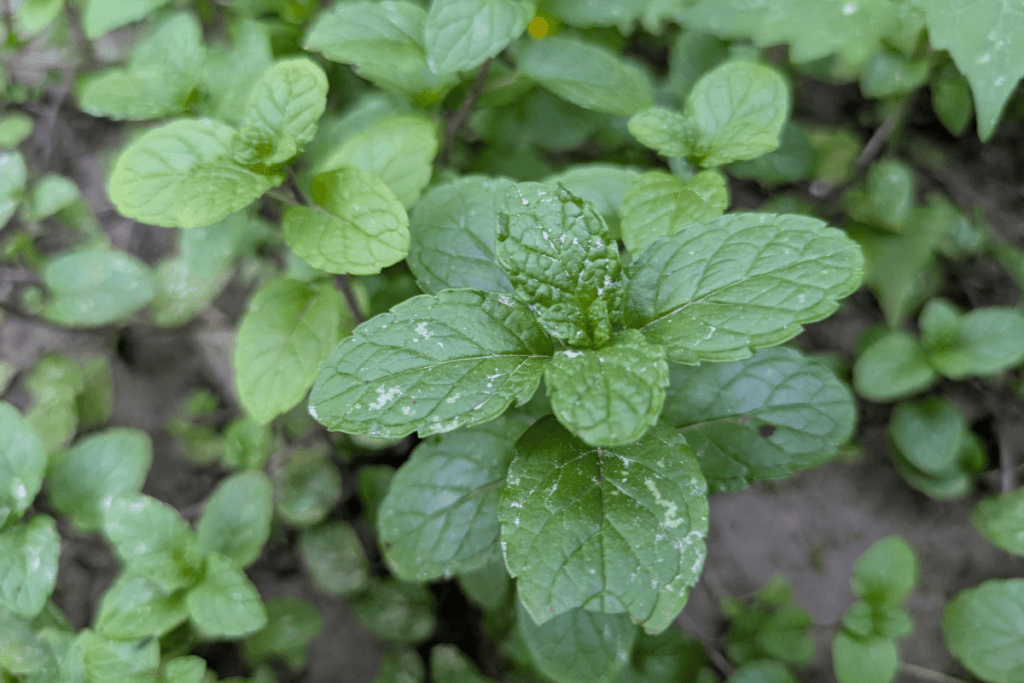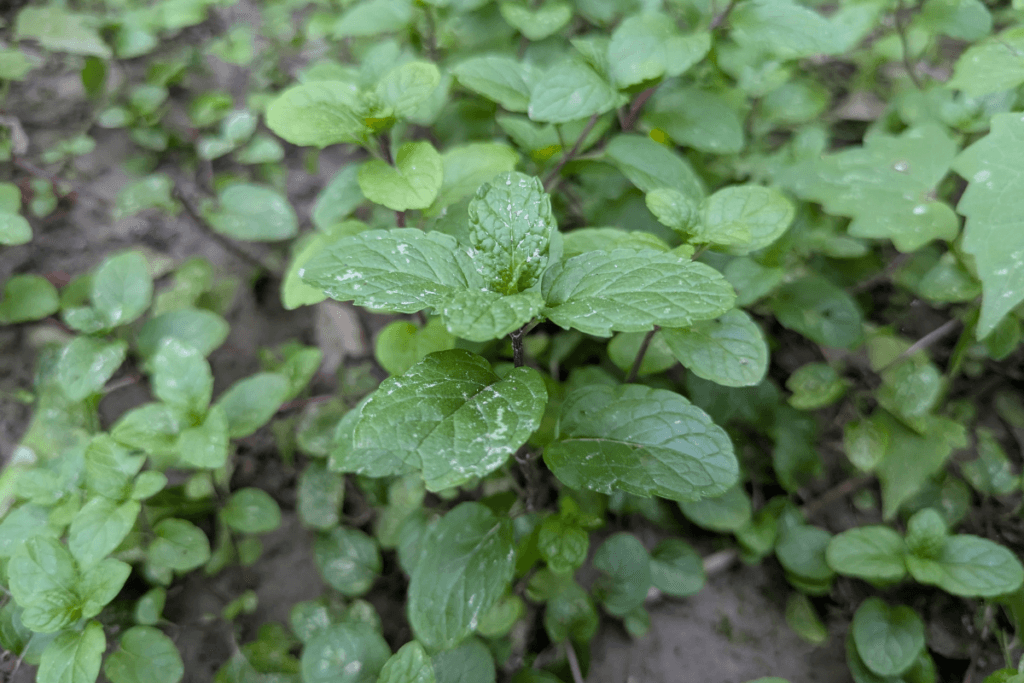Peppermint, scientifically known as Mentha × piperita, is an herb renowned for its medicinal and therapeutic properties. Revered in both modern and traditional medicine, it plays a significant role in Ayurveda, which emphasizes balance and holistic well-being. Peppermint is a treasure trove of essential oils, antioxidants, and menthol that support various aspects of health, including digestion, respiratory function, and stress relief. Discover the 10 Ayurvedic Peppermint Benefits to enhance your wellness journey.
It helps Digestion
Peppermint is celebrated for supporting digestive health by stimulating digestive enzymes, alleviating bloating, and reducing symptoms of indigestion. The menthol in peppermint relaxes gastrointestinal muscles, promoting smoother digestion. Among the 10 Ayurvedic Peppermint Benefits, aiding digestion is a key reason why peppermint is often used in Ayurvedic practices.
In Ayurveda, digestive health is vital for overall wellness. Peppermint pacifies Pitta dosha imbalances, like acid reflux and heartburn. It cools the digestive tract and enhances appetite while soothing nausea and vomiting, often when paired with herbs like ginger.

Relieves Headaches and Migraines
Peppermint’s cooling properties provide relief from tension headaches and migraines. Applying peppermint oil to the temples can reduce the intensity of headaches, especially those linked to sinus congestion. The 10 Ayurvedic Peppermint Benefits include its ability to alleviate headaches and migraines, which are commonly treated using peppermint in Ayurveda.
In Ayurveda, headaches are commonly related to imbalances in Vata and Pitta doshas. Peppermint’s cooling effects soothe Pitta-induced headaches, helping to clear mental fog, ease tension, and restore balance.
Improves Respiratory Health
Peppermint acts as a natural expectorant, clearing mucus and opening airways. It provides relief from colds, coughs, and sinusitis, while its menthol content offers antimicrobial properties. Among the 10 Ayurvedic Peppermint Benefits, improving respiratory health is one of the most significant reasons peppermint is used in Ayurvedic medicine.
Respiratory health in Ayurveda is connected to Kapha dosha, which governs mucus balance. Peppermint helps dissolve excess mucus and reduces sinus inflammation, providing relief from congestion and breathing difficulties.
Relieves Digestive Disorders
Peppermint’s antispasmodic properties alleviate symptoms of Irritable Bowel Syndrome (IBS), such as bloating and cramping. It also supports regular bowel movements and eases constipation. One of the 10 Ayurvedic Peppermint Benefits is its ability to soothe digestive disorders by promoting a healthy gut.
In Ayurveda, digestive disorders result from weak Agni (digestive fire) or imbalances in Pitta and Kapha doshas. Peppermint cools the digestive system, cleanses the intestines, and ensures nutrient absorption, promoting gut health.

Eases Stress and Anxiety
Peppermint’s refreshing aroma is widely used in aromatherapy to reduce stress, mental fatigue, and anxiety. Regular use of peppermint oil or tea can promote relaxation and improve mood. Another of the 10 Ayurvedic Peppermint Benefits is its ability to relieve stress and anxiety through its calming properties.
Stress and anxiety are often associated with Vata dosha imbalances in Ayurveda. Peppermint’s cooling properties calm the nervous system, promoting mental clarity and fostering peace and balance.
Boosts Immune System
Peppermint strengthens the immune system with its antibacterial, antiviral, and antifungal properties. The antioxidants and menthol in peppermint help protect the body from infections. As one of the 10 Ayurvedic Peppermint Benefits, peppermint plays a vital role in boosting immunity by supporting the body’s natural defenses.
In Ayurveda, immunity (Ojas) reflects overall health and balance. Peppermint enhances the body’s natural defenses, reduces inflammation, and supports a balanced immune response.
Promotes Skin Health
Peppermint oil is used in skincare for its cooling and antiseptic properties. It alleviates acne, skin irritation, and itchiness while promoting faster healing of wounds and reducing redness. Among the 10 Ayurvedic Peppermint Benefits, promoting skin health is one of the ways peppermint can be used for a clear, healthy complexion.
Skin health in Ayurveda is governed by Pitta dosha. Peppermint’s ability to balance Pitta makes it ideal for treating inflammatory skin conditions like acne and eczema, soothing irritation, and restoring skin balance.
Improves Circulation
Peppermint’s menthol acts as a vasodilator, improving blood flow and oxygen delivery. Better circulation boosts overall energy and vitality. This is yet another of the 10 Ayurvedic Peppermint Benefits that helps with revitalization and energy through improved circulation.
In Ayurveda, good circulation is linked to the flow of Prana (life energy). Peppermint stimulates this flow, revitalizing the body and ensuring proper oxygenation, which helps combat fatigue and low energy levels.
Relieves Muscle and Joint Pain
Peppermint oil’s analgesic and anti-inflammatory properties make it effective for easing muscle and joint pain. It is commonly used in massages to relieve stiffness and reduce swelling. One of the 10 Ayurvedic Peppermint Benefits is its ability to soothe muscle and joint pain by balancing Vata dosha imbalances.
Muscle and joint pain are often related to Vata dosha imbalances. Peppermint’s cooling and soothing properties pacify Vata, providing relief from pain and inflammation, commonly used in Ayurvedic oil blends for targeted pain relief.
Enhances Cognitive Function
Peppermint has been shown to improve memory, focus, and concentration. Its refreshing aroma stimulates the mind, combats mental fatigue, and boosts alertness. The 10 Ayurvedic Peppermint Benefits also include boosting cognitive function, which is why peppermint is often used in Ayurvedic remedies to improve focus and memory.
In Ayurveda, mental clarity is connected to a balanced Vata dosha. Peppermint helps sharpen cognitive function, calm the nervous system, and support mental agility, often used in remedies for enhancing focus and memory.
How to Use Peppermint in Ayurveda
Peppermint Tea: A soothing remedy for digestive issues, stress, and respiratory health.
Peppermint Oil: Apply a few drops to the temples for headache relief or use in steam inhalations for sinus clearance.
Peppermint Paste: A paste of fresh peppermint leaves can be applied to the skin to treat acne and irritation.
Peppermint Capsules: Convenient for digestive support, especially in alleviating IBS symptoms.
Aromatherapy: Inhale peppermint oil or use it in diffusers to promote relaxation and reduce anxiety.
Conclusion
Peppermint (Mentha × piperita) is a remarkable herb that provides numerous benefits in both modern and Ayurvedic practices. Its cooling, soothing, and healing properties make it an essential remedy for various ailments. Whether used as tea, oil, or in Ayurvedic formulations, peppermint is a valuable herb for promoting digestion, relieving stress, supporting immunity, and improving overall well-being. The 10 Ayurvedic Peppermint Benefits make this herb an indispensable part of your health and wellness routine.







